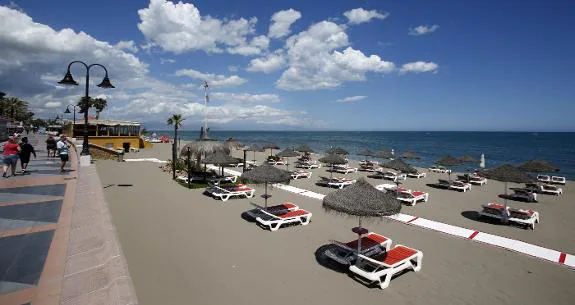Government aid plan to compensate for up to 40 per cent of lost income in hard-hit sectors
Of the 11-billion-euro total, seven billion will be direct aid but two billion of that is for the Balearic and Canary Islands
Pilar Martínez
Viernes, 19 de marzo 2021, 13:08
The government has given the go-ahead for 11 billion euros of support to be paid to businesses most affected by the pandemic, including those in the tourism industry.
It says seven billion of this will be in the form of direct aid, to compensate small and medium firms (SMEs) and the self-employed, in some 100 sectors considered to have been hit hardest by the health crisis, for up to 40 per cent of the loss in income. Other companies will be compensated for up to 20 per cent. Apart from the package of subsidies that will not have to be paid back, other measures will be applied to the whole productive network.
KEY POINTS OF THE PLAN
-
Direct aid
-
.
-
Non-repayable Between 3,000 and 200,000 euros for companies and the self-employed who lost at least 30 per cent of their income in 2020 compared to 2019 due to the pandemic.
-
Self-employed Those who pay under the module system can apply for up to 3,000 euros.
-
Compensation The companies will receive assistance to compensate for up to 40 per cent of the additional drop in income for SMEs and up to 20 per cent for the rest of firms.
-
Restructuring of debt
-
.
-
Beneficiaries Companies which have ICO loans. The line of assistance is three billion euros, giving a green light to the deductions and conversion into participatory loans.
-
Recapitalisation fund
-
.
-
Concept The sum of one billion euros will be allocated, and this will be managed by Cofides. The aim of this measure is to provide financial muscle to the companies in order to begin the economic recovery from the effects of the pandemic.
Minister of Finance María Jesús Montero and Minister for the Economy Nadia Calviño gave details of this programme after it was approved at a special cabinet meeting on Tuesday.
They explained that of the seven billion euros of direct aid, two billion will be exclusively for the Canary and Balearic islands, which they said had seen the greatest drop in GDP because of their reliance on tourism. However, the allocation of the funds has aroused controversy and the details given have only led to new uncertainties.
The direct aid will benefit companies whose income dropped by 30 per cent in 2020 compared with 2019. It will enable them to pay expenses such as salaries and rents, debts to suppliers, and electricity bills. Montero said the authorities will be able to tell who has lost 30 per cent of their turnover with information from the tax authority.
The amounts paid will be between 3,000 and 200,000 euros. Calviño said that the self-employed who pay under the module system will be able to receive up to 3,000 euros, while other self-employed people and companies will be eligible for between 4,000 and 200,000 euros.
Uncertainty over timing
The main uncertainty is when this money will reach the companies and how much each region of Spain will receive. Montero said she was sure that the agreements with the regional governments will be signed within a month and a half, and they will be responsible for paying these non-repayable grants to the companies.
She said the money will be paid according to the same criteria as the EU React funds, although the data on the impact of the pandemic is being updated in each region. In the first distribution of assistance funds, Andalucía received about 19 per cent of the total for the country.
One condition for receiving this financial support is that the companies must continue their activity until 30 June 2022 and may not pay out dividends or increase the remuneration of senior management in the next two years.
In addition to the direct assistance, the decree includes a line of three billion euros which will be managed by the ICO to extend the periods and amounts of the guarantees. This will enable the credits to be converted into participating loans, and will give the green light for the deductions. A new Code of Good Practice will be put into effect in the banking sector for this purpose.
